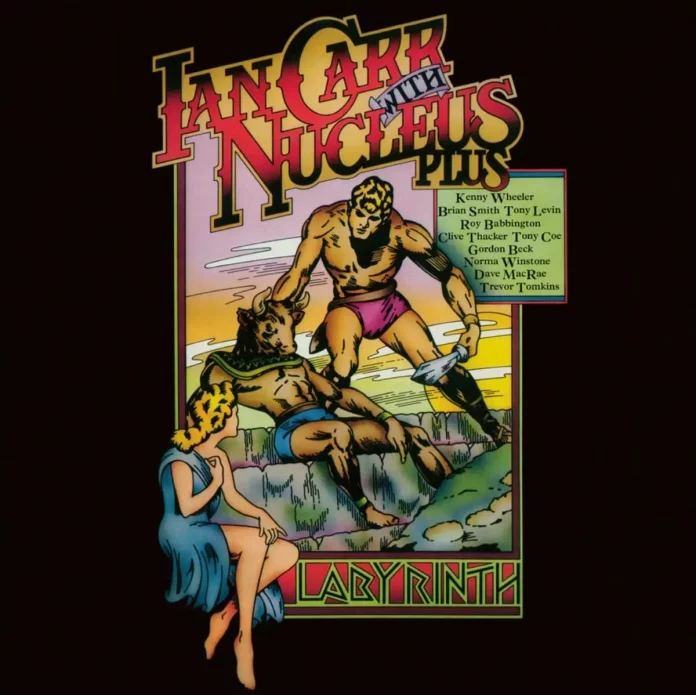Ian Carr is lucky: not many musicians manage to obtain an Arts Council grant to help them produce music, let alone have that music commissioned by the Park Lane Group. ‘Labyrinth’ begs the question as to how valid these grants are.
Inspired by the legend of the Minotaur from Greek mythology, “the music explores the structural and emotional aspects of the myth . . . runs the whole gamut of human emotions, love to hate, hope to despair, happiness to misery.”
For the sake of symbolism, Nucleus are joined by Norma Winstone, Kenny Wheeler, Tony Coe, Tony Levin and Gordon Beck, who all take various roles and elements in the story. Norma Winstone’s voice frequently dominates the music, and the laborious unison riffs of voice and instrument remind one again that while Centipede was an interesting experiment in its time, it was ultimately unsuccessful, however many virtuosi were involved.
Since I’ve always found Nucleus rather a fastidious band after the departure of Chris Spedding, Karl Jenkins and John Marshall, the extra personnel here are welcome. Tony Levin, for instance, certainly shows up Clive Thacker’s frequently inept drumming. However, Nucleus’ leaning towards the meandering riff in some unthinkable time signature is still here in force, and the likes of Babbington and MacRae are seemingly powerless to prevent it, or venture out. Babbington is now well ensconced in the Soft Machine, but I guess even the MacRaes of this world need a steady working band.
Nevertheless, despite what I find a pretentious and tedious composition, there are some moments: Wheeler’s soaringly triumphant and anguished solo in Bull-Dance, MacRae’s Fender on Exultation, contrasting to Beck’s delicious Hohner introduction to Norma Winstone’s Return To Forever-type song, Ariadne. At the premiere performance last March, even MacRae seemed hesitant in rejoining the foray after Beck’s riveting solo.
As for Carr’s playing, it really is rather uninspired; for all his talk about the need for adventure and experimentation in jazz, he does sound like a horribly anglicised Miles Davis (circa 1969) for much of the time. Like Davis too, it’s the musicians who surround him (especially in this enlarged Nucleus) who are of more interest, and if Davis’ newer music is supposed to waft out of black ghetto doorways, then this is the sort of music one could expect to come across on a wander through Belsize of a summer’s evening.
‘Labyrinth’ displays a total poverty of compositional flair and thoughtful arrangement. Does Ian Carr need a grant to produce this? He was better off without one. It’s corny and it ain’t necessarily so, but the old adage about art flourishing in adversity does come to mind.
Discography
Origins; Bull-Dance; Adriadne; Arena I – Arena II; Exultations; Naxos
Ian Carr (tr/flg-hn): Kenny Wheeler (tr/flg-hn): Norma Winstone (vcl); Tony Coe (clt/bs-clt/ten): Brian Smith (ten/sop/flt); Dave MacRae (elec-pno); Gordon Beck (elec-pno); Roy Babbington (bs-gtr); Clive Thacker (dm); Trevor Tomkins (perc); Tony Levin (dm); Paddy Kingsland (syn).
(Vertigo 6360 091 £2.38)
















